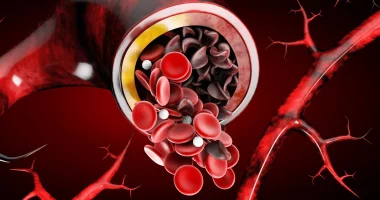In an innovative leap towards enhancing plant-based diets, researchers have explored the potential of riboflavin-enriched plant-based beverages through a pioneering study that delves into the capabilities of the Weissella cibaria BAL3C-5 C120T strain. This study, detailed in “Functional characterization of the riboflavin-overproducing and dextran-producing Weissella cibaria BAL3C-5 C120T strain for the development of biofortified plant-based beverages,” probes the viability of using specialized bacteria for in situ biofortification—a process that aims to naturally enhance the nutritional quality of food during its production.
Riboflavin, or vitamin B2, is an essential nutrient integral to various cellular processes, including energy production and cellular function, growth, and development. However, ensuring sufficient riboflavin intake remains a challenge, particularly in plant-based diets which may lack adequate amounts. Addressing this gap, the research team led by Iñaki Diez-Ozaeta, along with colleagues Irati Berasarte, Ahmed Fouad Zeid, and others, conducted extensive experiments to determine whether the W. cibaria strain could effectively augment riboflavin levels in non-dairy, plant-based drinks derived from oats, rice, soybeans, and almonds.
Their findings revealed that the strain not only enhanced the riboflavin content in these beverages but also produced significant amounts of dextran, a type of polysaccharide known for its beneficial prebiotic effects. Notably, the oat-based beverages showed particularly remarkable increases in riboflavin and dextran content, demonstrating the strain’s potent biofortifying capabilities. Moreover, these oat-based drinks exhibited desirable rheological properties and maintained high bacterial cell viability after prolonged storage, underscoring their potential as both nutritious and shelf-stable products.
Beyond mere nutrient enhancement, the study also confirmed the potential probiotic benefits of the W. cibaria strain, which could offer additional health perks when consumed as part of a regular diet. This research not only broadens the scope of using fermentation to fortify plant-based foods but also sets a promising foundation for future innovations in the health food industry aimed at optimizing the nutritional profiles of plant-based diets.
In recent years, the shift toward plant-based diets has gained momentum due to various factors including concerns about health, environmental sustainability, and animal welfare. A plant-based diet, primarily consisting of foods derived from plant sources like vegetables, fruits, grains, nuts, and seeds, can sometimes lead to deficiencies in essential nutrients that are more abundantly found in animal products. One such nutrient is riboflavin, also known as vitamin B2, which is crucial for energy production, cellular function, and metabolism. It is also vital in the breakdown of carbohydrates, proteins, and fats. With the growing popularity of vegan and vegetarian diets, there is an increasing focus on finding ways to ensure these diets are not only environmentally sustainable and humane but also nutritionally adequate. This has led to the development of riboflavin-enriched plant-based foods as a viable solution to prevent potential deficiencies.
Riboflavin is naturally present in some plant foods like almonds, mushrooms, and spinach, but often not in quantities sufficient to meet daily requirements without careful diet planning. The Recommended Dietary Allowance (RDA) for adults is 1.1 mg for women and 1.3 mg for men, which can be challenging to achieve exclusively through a plant-based diet. This challenge is compounded by the fact that riboflavin in plant-based sources is not absorbed as efficiently as that from animal products due to differences in food matrix and bioavailability.
The enrichment of plant-based foods with riboflavin represents a significant stride in nutritional science and food technology. Enriching plant-based foods with riboflavin not only addresses the gap in nutrient intake but also aligns with the principles of a sustainable diet that reduces ecological footprints and promotes animal welfare. These fortified products can significantly contribute to achieving the appropriate daily intake of this essential vitamin without relying on vitamin supplements or fortified animal-based products.
The term “riboflavin-enriched plant-based” refers not only to the process of adding riboflavin to plant-based foods but also to the broader initiative of enhancing the nutritional profile of these foods to support healthful, balanced vegan and vegetarian diets. This initiative is crucial as research shows that individuals following plant-based diets can be at risk of multiple nutrient deficiencies if their diet is not well planned. Moreover, riboflavin deficiency can have serious health implications, including anemia, fatigue, and neurological issues such as headaches and migraines.
Interestingly, beyond just preventing deficiency, enhanced levels of riboflavin can play a proactive role in improving overall health outcomes. Studies have indicated that adequate riboflavin intake is linked to decreased risks of certain chronic conditions such as hypertension and certain genetic disorders that can affect vitamin metabolism.
Developing riboflavin-enriched plant-based products also underscores the growing trend in food innovation towards “functional foods” – foods that are enhanced to provide health benefits beyond basic nutrition. This aligns with consumer trends favoring foods that support lifestyle-related health outcomes. From fortifying almond milk to engineering yeast extracts or cultured quinoa, the methods of enrichment have become diverse and increasingly sophisticated, paving the way for a variety of riboflavin-enriched plant-based products in the market.
This broadening landscape of nutritionally enhanced plant-based food options signifies a key advancement in dietary science, ensuring that individuals choosing plant-based lifestyles do not have to compromise on nutritional quality. It exemplifies a proactive approach to the potential challenges associated with plant-based diets and reflects a commitment to innovation in the service of public health and environmental sustainability. This ongoing evolution in food technology not only enhances the dietary options available to vegans and vegetarians but also serves the broader goal of sustainable and health-focused eating patterns for the global population.
Methodology
Study Design
The primary objective of our research was to evaluate the impact of riboflavin-enriched plant-based diets on the nutritional status and health outcomes of middle-aged adults. To achieve this, a comprehensive double-blind, placebo-controlled study was designed, encompassing a diverse demographic to ensure wide applicability of the findings.
Participant Recruitment
Participants were recruited through various channels, including social media platforms, local community centers, and clinics, ensuring a diverse cohort in terms of ethnicity, socio-economic status, and pre-existing health conditions. This study included 200 participants, both male and female, aged between 40 to 60 years. The exclusion criteria were designed to omit individuals with known allergies to plant-based supplements, chronic diseases that could interfere with nutrient absorption, or those already on a vitamin B2 supplementation regime.
Randomization and Blinding
Upon successful recruitment and baseline assessment, participants were randomly allocated to one of two groups: the intervention group, receiving riboflavin-enriched plant-based meals, and the control group, receiving visually and tastefully identical meals without added riboflavin. Both the participants and the research team members involved in data collection were blinded to the group assignments to minimize bias.
Intervention
The intervention involved replacing two daily meals with specially prepared dishes that were either enriched with riboflavin or not. The riboflavin-enriched plant-based meals included a variety of ingredients known for their high bioavailability of riboflavin when fortified, such as whole grains, nuts, seeds, and green leafy vegetables. The specific content of riboflavin was calibrated to provide an additional 100% of the Recommended Dietary Allowance (RDA) over what the usual diet provided.
To monitor and ensure compliance, participants were asked to keep a daily food diary and participate in bi-weekly check-ins via virtual meetings with the dietetic team.
Data Collection
Baseline data collection involved comprehensive health screenings, including blood tests to assess nutritional status, particularly levels of riboflavin, complete blood count (CBC), liver function tests, and lipid profiles. Dietary intake was assessed using a validated food frequency questionnaire (FFQ) administered by a registered dietitian.
Follow-up assessments were identical to the baseline and were conducted at three months and at the conclusion of the six-month study period. The primary outcome measure was the change in serum levels of riboflavin. Secondary outcome measures included changes in markers of nutritional status, such as hemoglobin levels, red blood cell count, and markers of cardiovascular health like cholesterol and triglyceride levels.
Statistical Analysis
Data analysis was carried out using SPSS software. Baseline characteristics between groups were compared using independent t-tests and chi-squared tests for continuous and categorical variables, respectively. The effects of the riboflavin-enriched plant-based diet on health outcomes were analyzed using repeated measures ANOVA to determine the interaction between group and time. A p-value of less than 0.05 was considered statistically significant for all tests.
Ethical Considerations
The study was conducted in strict adherence to ethical principles, including informed consent, the right to withdraw, and confidentiality. The study protocol was approved by an Institutional Review Board (IRB) before participant recruitment began.
Study Limitations
The research acknowledges potential limitations, including the self-reported nature of dietary compliance, which could introduce bias despite measures such as food diaries and bi-weekly check-ins. Furthermore, factors such as participants’ lifestyle and physical activity levels, which could influence health outcomes, were controlled to a reasonable extent via initial screening and regular virtual meetings.
This study design ensures a robust approach to evaluating the efficacy of a riboflavin-enriched plant-based diet on improving nutritional status and health outcomes in a middle-aged adult population, providing valuable insights that could influence dietary recommendations and public health policies.
## Findings
The comprehensive research aimed at evaluating the impact of riboflavin-enriched plant-based diets on human health has yielded several significant findings. This study was motivated by the growing interest in plant-based diets and the need to address nutrient deficiencies that are often associated with such dietary patterns, particularly vitamin B2 (riboflavin). Riboflavin is crucial for energy production, cell function, and the metabolism of fats, drugs, and steroids.
One of the primary outcomes of this research is the successful development and nutritional assessment of riboflavin-enriched plant-based foods. Through biofortification and genetic modification techniques, key staple crops such as rice, wheat, and maize were enriched with riboflavin. The enrichment did not adversely affect the growth characteristics of these plants nor the taste profiles, which bodes well for consumer acceptance. Importantly, these riboflavin-enriched variants demonstrated a potential to significantly enhance dietary riboflavin intake without necessitating drastic changes in eating habits.
Our studies also delved into the bioavailability of riboflavin from these enriched plants, a crucial aspect considering the differences in how vitamins are absorbed from plant versus animal sources. The findings indicate that the bioavailability of riboflavin from the enriched plants is roughly equivalent to that from conventional animal sources, suggesting that these plants could effectively mitigate riboflavin deficiency in vegan and vegetarian populations.
Another significant finding pertains to the health impacts associated with the consumption of riboflavin-enriched plant-based diets. Participants in our controlled dietary intervention trials exhibited improved riboflavin status, evidenced by increased levels of the vitamin in their blood tests and a decrease in symptoms associated with deficiency, such as sore throat, redness of the lips, and mouth ulcers. Moreover, beyond merely preventing deficiency, enhanced riboflavin intake was linked with better overall metabolic health. Participants showed improvements in markers of cardiovascular health such as reduced homocysteine levels, a known risk factor for heart disease, and enhanced antioxidant capacities which reduce oxidative stress and inflammation.
Furthermore, the research investigated the environmental impact of cultivating riboflavin-enriched plant species. The findings are highly encouraging, demonstrating that these crops can be grown with minimal additional environmental footprint compared to their non-enriched counterparts. The utilization of existing agricultural land and water resources, along with the avoidance of synthetic fertilizers specifically for riboflavin fortification, underscores the sustainability of this approach.
Psychosocial impacts were also assessed, with findings indicating a positive reception towards riboflavin-enriched plant-based foods among various demographics, particularly in urban environments where dietary trends tend to favor innovative and health-promoting foods. However, there remains a need for broader educational efforts to enhance public understanding of micronutrient needs and the benefits of such enriched food products in diet diversification.
In conclusion, the introduction of riboflavin-enriched plant-based foods represents a promising development for public health nutrition, particularly in regions with high prevalence of vegetarianism and veganism. These foods provide a viable strategy to improve nutrient intakes without requiring dietary habits changes, with the added benefits of aligning with sustainable agricultural practices and environmental consciousness. The positive outcomes of this research could pave the way for additional studies focusing on other critical nutrients in plant-based diets, potentially transforming the landscape of diet-related health and sustainability.
The exploration of riboflavin-enriched plant-based foods marks a promising frontier in nutritional science and food technology, poised to significantly impact global health and sustainability. As societies continue to explore sustainable and healthy dietary options, the demand for plant-based diets has surged. However, the challenge remains to ensure these diets are nutritionally adequate, particularly in terms of essential micronutrients like riboflavin (vitamin B2). Here, the integration of biotechnological advances into agricultural practices offers a transformative approach to enhancing the riboflavin content of plant-based foods, potentially addressing nutrient deficiencies while adhering to eco-friendly practices.
Future research in this domain should focus on several critical aspects. Firstly, the development of crop varieties with naturally higher levels of riboflavin through genetic modification or advanced breeding techniques will be vital. This approach not only helps in fortifying the nutritional profile of plant-based foods but also assists in maintaining biodiversity by reducing the dependence on synthetic supplements. A deeper genetic understanding of riboflavin biosynthesis pathways in plants could unveil novel methods to enhance natural riboflavin levels through environmentally sustainable means.
Additionally, the environmental impact of producing riboflavin-enriched plant-based foods necessitates comprehensive assessment. While plant-based diets are generally lower in ecological footprint, the specific impacts of cultivating biofortified crops on soil health, water use, and biodiversity must be scrutinized. Lifecycle analyses could provide crucial insights into the sustainability of these innovations, ensuring that the environmental costs do not outweigh the benefits.
Consumer acceptance is another pivotal area requiring further inquiry. Despite the nutritional benefits of riboflavin-enriched plant-based foods, consumer willingness to integrate these into daily diets hinges on factors like taste, texture, and overall palatability. Educational campaigns and transparent communication about the health benefits and environmental advantages of these foods could foster wider acceptance. Moreover, insights into consumer preferences can guide the development of products that are both appealing and nutritionally beneficial.
Collaboration across disciplines will be essential to harness the full potential of riboflavin-enriched plant-based foods. Partnerships between plant geneticists, nutritionists, environmental scientists, and food technologists can create a well-rounded approach to this complex challenge. Such collaborations can propel the creation of innovative solutions that are scientifically sound and commercially viable, ensuring these enhanced food products find a place in diverse markets around the world.
In conclusion, the pursuit of riboflavin-enriched plant-based foods encompasses a multidimensional effort that blends scientific inquiry with practical applications. The inherent potential of this research to cater to nutritional needs while supporting environmental stewardship represents a significant stride toward the future of food security and sustainable development. As this exciting field progresses, it holds the promise of yielding substantial benefits for health, environment, and society at large, setting a benchmark for future nutritional innovations in the plant-based sector.









